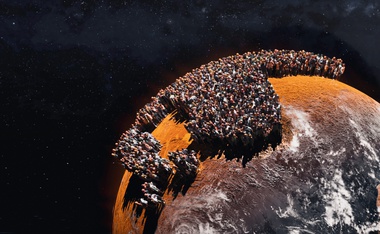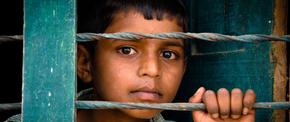The views expressed in our content reflect individual perspectives and do not represent the authoritative views of the Baha'i Faith.
The United Nations estimates that our planet’s human population will reach 8 billion – that’s 8,000,000,000, with 9 zeroes, more of us than the world has ever held – sometime late in 2022.
Eight billion is only a number – a really, really big number – but many scientists say that the Earth has already exceeded its biocapacity, and urge us to view overpopulation as a crisis we must fix immediately.
That’s certainly an understandable concern, since the world’s population passed the 7 billion mark only a decade ago in 2012. In one decade, we’ve added one billion people. We humans are experiencing the fastest growth ever, with the number of people on Earth now expanding by approximately 140 million each year. That works out to 267 new babies born every minute.
RELATED: 5 Reasons Why Development is the Best Contraceptive
Just try to conceptualize this unprecedented exponential rise: in the year 1800, the Earth supported a billion people. In 1950, halfway through the 20th century, that number had more than doubled. By the end of the 20th century, we reached 6 billion people. This exponential rate of growth represents something completely new in human history – one of the greatest challenges we have ever faced.
One Billion of Anything: Hard to Imagine
A billion of anything is hard to imagine. It helps to think of it in terms of time: a thousand seconds equals about 17 minutes. A million seconds equals 12 days. A billion seconds equals 31 years.
By the year 2100, according to a recent study in the journal Science, the Earth will hold somewhere on the order of 11 billion people. Alternative demographic and birthrate projections estimate as many as 15 billion.
Explosive population growth has happened for very good reasons, however. We’ve figured out ways during the last few centuries to grow more food, prevent or cure more diseases, reduce infant mortality, and stop waging massive and deadly global wars. The plague, the Black Death, and the huge influenza epidemics of the past are now ancient history. With the onset of the Covid-19 pandemic, humanity developed effective vaccines and treatments in record time. We know more, and we can do more, so we can save more people.
But because we’ve been so successful in moving these kinds of humanitarian, social, and public health initiatives forward, we’ve witnessed a massive increase in human population. This has raised a whole host of tough questions: Do we have the resources to support such rapid growth? Is this level of population growth sustainable? Can we possibly feed, clothe and shelter that many people? No one really knows, because we’ve never tried it before. The planet has become an experimental petri dish, and we have no idea what it will become or how crowded it can potentially get.
Can We Control Population Growth with Contraception?
All of this rapid growth means contraception has become increasingly important. The United Nations says:
Around the world, some 225 million women who want to avoid pregnancy are not using safe and effective family planning methods, for reasons ranging from lack of access to information or services to lack of support from their partners or communities. Most of these women with an unmet demand for contraceptives live in 69 of the poorest countries on earth.
Access to safe, voluntary family planning is a human right. It is also central to gender equality and women’s empowerment, and is a key factor in reducing poverty. Investments in making family planning available also yields economic and other gains that can propel development forward.
This issue – birth control and universal access to safe, effective family planning – has sparked significant religious debate in the past, and still does today. Major religious organizations have opposed modern birth control methods like the pill. Catholics and some Orthodox Jewish groups outlaw artificial contraception. Even some governments have made those methods illegal for moral or political reasons.
RELATED: Private: The Birth of the Birth Control Pill
Baha’is and Birth Control
So how do Baha’is deal with this important issue? Well, the Baha’i teachings on birth control have definitely evolved over time, which shows that the primary Baha’i principle of the agreement of science and religion, and the flexibility of a democratically-elected universal leadership body, both allow the Faith to evolve, react, and adjust to new scientific developments rather than falling back on any rigid dogma.
For an example of that evolution, note the difference between these two letters, the first from a secretary of the Baha’i Guardian, Shoghi Effendi, written in 1935; and the following one almost 50 years later in 1981 from the Universal House of Justice:
- As to the problem of birth control. Neither Baha’u’llah nor Abdu’l-Baha has revealed anything direct or explicit regarding this question. But the Baha’i Teachings, when carefully studied imply that such current conceptions like birth control, if not necessarily wrong and immoral in principle, have nevertheless to be discarded as constituting a real danger to the very foundation of our social life.
- As to birth control methods, the House of Justice does not wish to comment on the effectiveness or possible hazards of present-day contraceptive agents, and leaves it to individuals to decide what course of action they will take in light of the teachings and the best medical advice available …
Of course, we need to understand the context here: birth control in 1935 was vastly different than the safe modern oral contraceptives first developed in the 1960s, which explains why the advice from the Baha’i administrative order has changed and progressed.
In the 1930s, birth control often involved harsh chemicals, primitive and harmful intrauterine devices, relatively crude elective abortions that often resulted in injury and even death, or permanent sterilization – and in most places, all those methods were against the law. Now, oral contraceptives and much more sophisticated, benign contraceptive devices are safely, widely, and legally used for effective birth control all around the world.
But the larger issue, of course, involves much more than just the modern methods used to limit and control fertility. As Abdu’l-Baha pointed out in a speech he gave in Pittsburgh in 1912, it directly involves the emancipation, education, and equality of women:
… the principle of religion has been revealed by Baha’u’llah that woman must be given the privilege of equal education with man and full right to his prerogatives. That is to say, there must be no difference in the education of male and female in order that womankind may develop equal capacity and importance with man in the social and economic equation. Then the world will attain unity and harmony.
Baha’is believe that women must have full and complete equality, including an equal voice in the highly important decisions about procreation.
In every place where that kind of advanced social evolution has happened, women have become much more likely to follow the trend in all countries with widely-available contraception, and opt to stop having so many children. If given a choice, women will limit the world’s birthrate.
When that occurs all across the planet, in every country and culture – when women have choices about reproduction – the world’s population will be much more likely to stabilize. If we want to minimize the impact of exponential population growth, we must make sure that women become full decision-making partners with men in every aspect of human society.
















Comments
Sign in or create an account
Continue with Googleor